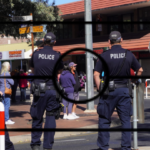Northern Territory Government’s Tough-on-Crime Laws Target Vulnerable Youths.

Newly minted Northern Territory chief minister Lia Finocchiaro has been threatening to crack down on youth crime since she introduced her own set of bail measures into the unicameral NT parliament in 2022, and in the lead up to this year’s August election, of which she took out a landslide victory, her party, the Country Liberals, had been warning it was about to get tough on crime.
If elected, the Country Liberals were promising to drop the age of criminal responsibility, lift the ban on the use of spit hoods, reenact the offence of public drunkenness, reinstate breach of bail for youth offenders, instal a presumption against bail for serious violent offenders, as well as broaden powers that allow officers to wand, or run metal detectors over, civilians.
However, no one had expected the Finocchiaro government to go to town in quite the way it did on its second day in office, as it introduced a smorgasbord of tough-on-crime measures, with four of the five separate bills that were introduced into the NT Legislative Assembly on 16 October 2024, passing before that day’s proceedings came to an end.
Former attorney general and current NT Labor MLA Chansey Paech told The Guardian prior to the legislative onslaught that he considered the promised reforms involve “the Country Liberal government using the criminal justice system as a contemporary system of racial control, because the legislation… disproportionately targets Aboriginal people”. And he was spot on.
Back to the dark ages
On 16 October 2024, the Country Liberal Party introduced and passed the Police Administration Amendment Bill 2024, the Bail Legislation Amendment Bill 2024, the Liquor Legislation Further Amendment Bill 2024 and the Criminal Code Amendment Bill 2024. The current NT AG Marie-Clare Boothby also introduced the yet-to-be-passed Sentencing Amendment Bill 2024.
On introducing the bail reform, NT chief minister Finocchiaro told parliament that in her jurisdiction, “violent offences by youths and adults have been an ongoing problem, leaving many Territorians afraid to leave their homes”, and she added that “some have even decided that the Territory is no longer a safe place to live and have moved interstate”.
The ultraconservative parliamentarian who appears to be trying to drag the NT back not the Middle Ages, Finocchiaro further outlined that over the 12 months to June this year, adults were charged with offences on 9,974 occasions, and of these 12 percent of offenders were on bail, while, in terms of youths, on 1,411 occasions young people were charged with offences, with 53 percent on bail.
NT agriculture and fisheries minister Gerard Maley introduced the law to lower the age of criminal responsibility from 12 to 10, when the idea had been on raising it from 10 to 12 in August last year and then on towards raising it to 14 years old at a later point. Maley fobbed off the move in stating it sought to ensure that 10-year-olds who break the law will be afforded rehabilitation.
In terms of optics, lowering the age of criminal responsibility appears as the most regressive reform involved in the Finocchiaro government’s tough-on-crime law-enacting bonanza that first and foremost targets Indigenous youth.
Kiddie torture a-gogo
The first bill up for debate on the 16 October was the bail reform bill, which has resulted in the reinstatement of the offence of breach of bail for youths, a single ‘presumption against bail’ regime for adults and youths, presumption against bail for all serious violent offences regardless of any weapons used and an expansion of the presumption against bail for offences whilst on bail.
Next up were the changes to the Criminal Code 1983 (NT), which served to lower the age of criminal responsibility from 12 to 10, as well as introduce the offence ram-raiding using a motor vehicle, which carries 10 years and the new offence of posting and boasting, which was recently rolled out in NSW, and involves 2 years inside for bragging about conducting certain crimes online.
From there, attention turned to the NT liquor law amendments. The legislation that passed NT parliament resulted in the enactment of the offence of consumption of liquor in a prohibited public place, which sees those falling foul of it, liable to a fine of up to $925.
And whilst public drunkenness laws might be colourblind those policing them are not, and such laws are known to disproportionately impact Aboriginal and Torres Strait Islander peoples and being hauled into the station and being placed in a cell in regard to alcohol consumption is known to lead to deaths in custody.
The last piece of crack-down-on-crime legislation to pass the new parliament was the Police Administration Amendment Bill, which simplified police powers around wanding laws – the protocols governing police use of handheld scanners to detect knife crimes – in public places, on public transport and in schools. Wanding laws were recently rolled out in NSW.
The fifth tough-on-crime bill introduced last week was the Sentencing Amendment Bill. Yet to be passed, it inserts a mandatory minimum sentence of an actual term of prison to apply to the offence of assaulting a worker, while it also did the same for the offence of assault emergency worker or police officer, so that a person found guilty of these crimes must spend at least 3 months inside.
As for the use of spit hoods, NT police commissioner Michael Murphy explained to the press last week that the restraint devices that can prove lethal were only banned for police operationally and that was being lifted last week, so spit hood use is back on at police watchhouses, where they will be permitted to be used on children. But the controversial devices remain banned at youth gaols.
An intervention of sorts
Underlying this winding back of the clock in the Northern Territory is the fact that in mid-2016 the ABC exposed the horrors of adult prison guards torturing and teargassing kids in prison cells at Darwin’s Don Dale child facility.
This led to the Royal Commission into the Protection and Detention of Children in the Northern Territory, which recommended raising of the age and a commitment to closing Don Dale.
But 8 years later, Don Dale still stands, the age of criminal responsibility in the NT is once again at 10 years old and the earlier nationwide calls for prison reform, especially around youth prison reform, have fallen by wayside.
The NT youth justice system continues to consistently have a child prisoner population comprised of at least 90 percent Aboriginal children.
The crackdown on First Nations youth this year has not been confined to the Northern Territory. NSW parliament had a crack. The government of Victoria proved too it could legislate regressively, while Queensland, like the NT before it, is heading towards an election with youth crime as a primary focus, and the WA youth justice system has been torturing kids at a rising rates for the entire 2020s.
And another disturbing aspect about the nationwide crackdown on Indigenous youth at present is that if we want another example of a settler colonial nation that mistreats and abuses Indigenous youth in its institutions, the genocidal nation of Israel is the go-to.







